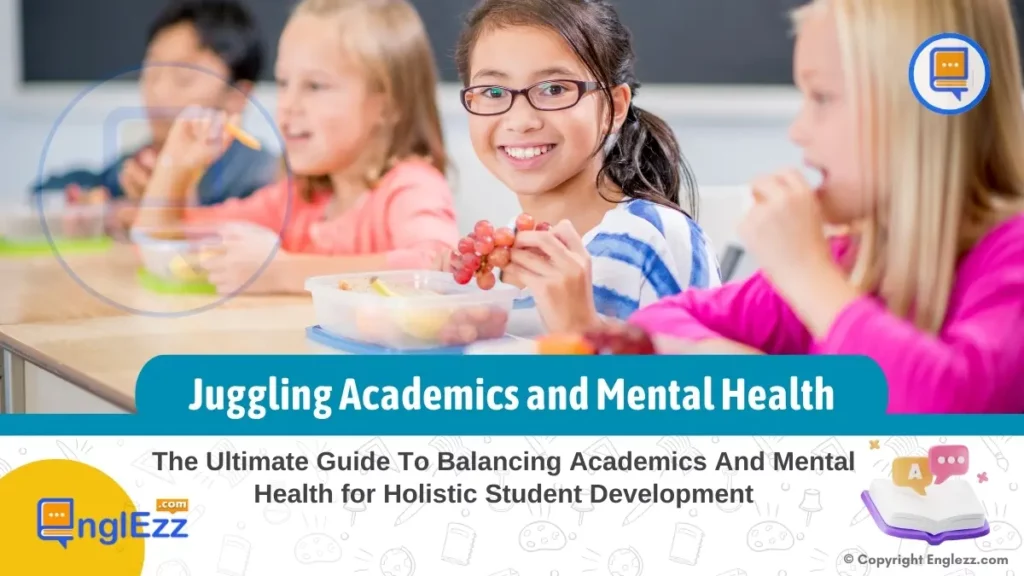In the intricate tapestry of student life, the intertwining threads of academics and mental health form a vital foundation for holistic development. Balancing the pursuit of academic success with the nurturing of mental well-being is not merely a choice but a necessity in cultivating resilient and thriving individuals. Master the art of balancing academics and mental health for a well-rounded student experience. Elevate your holistic development today!
As students embark on their educational journey, they are faced with a delicate dance between achieving scholarly goals and safeguarding their emotional equilibrium. This harmonious blend is where true growth flourishes, where intellectual prowess walks hand in hand with emotional fortitude.
Table of Contents
- Juggling Academics and Mental Health for Holistic Student Development
- Time Management Strategies
- Seeking Support Systems
- Creating a Healthy Study-Life Balance
- Implementing Self-Care Practices
- Building Resilience Skills
- Fostering a positive mental health environment
- Monitoring Progress and Seeking Professional Help
- Achieving Holistic Growth Through Balanced Living
- Achieving Balance: A Foundation for Holistic Student Growth
- FAQs:
- Q: How can I recognize my individual stress triggers?
- Q: What are some effective time management strategies for students?
- Q: How do I know if I need professional mental health support?
- Q: Why is creating a supportive environment important for student well-being?
- Q: Can self-care truly improve academic performance?
Juggling Academics and Mental Health for Holistic Student Development
Amidst the academic whirlwind, students often find themselves navigating through a maze of stress triggers that can disrupt their cognitive harmony and emotional stability. From looming deadlines to performance pressures, these stressors cast shadows over the path to academic achievement. Yet within this labyrinth lies an opportunity for self-discovery and empowerment.

By shedding light on common stress triggers and delving into personalized approaches to identify and address individual pressure points, students can unravel the complexities that entwine academics and mental well-being. Through strategic coping mechanisms tailored to combat academic-related stress, learners can forge resilience amidst challenges while fostering a mindset anchored in self-awareness and adaptability.
Time Management Strategies
One of the key skills that students must master to balance academics and mental well-being is efficient time management. By effectively managing their time, students can not only excel in their studies but also carve out space for self-care activities crucial for maintaining good mental health. Prioritizing tasks is a fundamental aspect of time management as it helps students focus on what needs to be done first, reducing feelings of overwhelm. For instance, creating a daily or weekly schedule with both academic responsibilities and self-care activities can provide a clear roadmap for students to follow.
To optimize study time while safeguarding mental well-being, practical approaches such as the Pomodoro Technique can be incredibly beneficial. This technique involves breaking study sessions into focused intervals followed by short breaks, helping maintain concentration levels and prevent burnout. Additionally, incorporating mindfulness practices into study breaks, such as deep breathing exercises or stretching routines, can further promote relaxation and mental clarity. By intertwining study sessions with brief moments of rejuvenation, students can enhance productivity while nurturing their emotional well-being.
A valuable tip for students navigating the realm of academia is to use technology wisely in their time management endeavors. Utilizing apps or online tools designed for organizing tasks, setting reminders, and tracking progress can streamline the planning process and help individuals stay on top of deadlines effectively. Moreover, leveraging digital resources for creating study timetables or virtual study groups can foster collaboration and motivation among peers. By embracing technological advancements strategically, students can strike a harmonious balance between their academic commitments and mental health needs.
Seeking Support Systems
Navigating the challenges of balancing academics and mental health can feel overwhelming, but seeking support systems can make a significant difference in a student’s well-being. It’s crucial to emphasize the importance of reaching out to peers, educators, and mental health professionals for guidance and assistance. For instance, forming study groups with classmates not only fosters collaboration but also provides a supportive environment where students can share academic struggles and seek help when needed. Teachers who are open to communication can offer valuable insights and resources to aid students in managing their academic workload while prioritizing self-care.
Prioritize self-care by incorporating consistent routines into your daily schedule. Whether it’s a morning meditation session, a regular exercise routine, or simply taking breaks to relax and recharge, finding time for self-care can significantly improve your mental well-being while managing academic responsibilities. For example, creating a designated study space that is separate from your relaxation area can help create a clear boundary between work and leisure time.
Building a strong support network is key to tackling both academic and emotional challenges effectively. This network may include friends, family members, school counselors, or mental health professionals who can provide varying degrees of support based on the student’s needs. By encouraging students to cultivate relationships with individuals who uplift and motivate them, they are more likely to navigate stressful situations with resilience. Moreover, promoting open communication about mental health within educational environments helps reduce stigma and normalizes discussions around seeking help when facing difficulties.
Incorporating peer support programs or wellness initiatives within schools can further encourage students to take advantage of available resources for mental health support. For example, establishing mentoring programs where older students guide younger peers through academic struggles while offering emotional support can create a sense of community among students. By fostering an environment that values both academic achievement and emotional well-being, educational institutions play a vital role in promoting holistic student development through robust support systems.
Creating a Healthy Study-Life Balance
In the hustle and bustle of academic demands, it’s crucial for students to find equilibrium between their studies and personal well-being. One effective way to achieve this balance is by incorporating relaxation techniques into daily routines. For example, setting aside time each day for activities such as mindfulness meditation, yoga, or even just going for a walk can help alleviate stress and prevent burnout. By consciously scheduling moments of relaxation amidst study sessions, students can recharge their mental batteries and approach their academic responsibilities with renewed focus and clarity.
Moreover, advocating for setting boundaries between academics and self-care is paramount in maintaining a positive study-life balance. Establishing clear boundaries around study hours, leisure activities, and social interactions allows students to allocate time for both work and self-care without feeling overwhelmed. For instance, designating specific times when schoolwork is off-limits can create a sense of structure and predictability in one’s routine, leading to improved overall well-being. By respecting these boundaries, students can cultivate a healthy relationship with academia while safeguarding their mental health.

By finding harmony between academic responsibilities and personal well-being through relaxation techniques and boundary-setting strategies, students can foster a positive equilibrium in their study-life balance. Embracing self-care practices not only enhances academic performance but also nurtures holistic development by prioritizing mental wellness alongside scholastic achievements. Ultimately, creating a healthy balance between academics and self-care empowers students to navigate the challenges of student life with resilience and vitality.
Implementing Self-Care Practices
When it comes to maintaining a healthy balance between academic rigor and mental well-being, self-care practices play a pivotal role in enhancing overall student development. By incorporating mindfulness exercises, such as deep breathing or meditation, students can cultivate a sense of inner calm amidst the challenges of academic life. These practices not only help in reducing stress levels but also improve focus and concentration, ultimately leading to better academic performance.
Physical activities offer another avenue for students to destress and rejuvenate their minds. Whether it’s going for a brisk walk, engaging in a workout session, or practicing yoga, physical movement can release endorphins that elevate mood and energy levels. Encouraging students to find joy in staying active not only benefits their physical health but also significantly impacts their mental well-being by reducing anxiety and promoting relaxation.
Moreover, exploring hobbies outside of academics is essential for holistic student development. Engaging in activities like painting, playing musical instruments, gardening, or even cooking provides an outlet for creativity and expression. These pursuits serve as therapeutic escapades from the demands of schoolwork and foster a sense of fulfillment that contributes positively to mental wellness. Overall, integrating self-care practices into daily routines equips students with the tools necessary to navigate the complexities of academic life with resilience and grace.
Building Resilience Skills
In the dynamic landscape of academia, cultivating resilience is a crucial skill that equips students to overcome challenges while safeguarding their mental well-being. By acknowledging setbacks as opportunities for growth rather than defeat, individuals can develop a robust mindset resilient to academic stressors. One effective strategy for building resilience is reframing adversities as learning experiences. For instance, if a student receives feedback on a less-than-perfect assignment, viewing it as a chance to refine skills and seek improvement fosters a growth-oriented approach.
Additionally, providing resources for developing adaptive coping mechanisms during high-stress periods is essential in promoting resilience among students. Techniques like cognitive reframing, mindfulness practices, and seeking support from peers or mentors can help individuals navigate academic pressures with greater ease. By empowering students with these tools, educational institutions create a supportive environment that fosters mental fortitude and emotional well-being. Encouraging proactive engagement in extracurricular activities or leadership roles can also nurture resilience by offering diverse experiences that enhance problem-solving abilities and adaptability.
Moreover, bouncing back from setbacks gracefully involves instilling self-compassion in students’ mindsets. Understanding that mistakes are part of the learning process and not reflections of personal inadequacies cultivates resilience in dealing with academic challenges. By fostering an attitude of perseverance and self-belief, educators contribute significantly to students’ ability to weather turbulent academic times with resilience intact. Ultimately, the combination of effective coping strategies, positive self-talk, and a growth mindset forms the bedrock upon which students can build enduring resilience skills essential for both academic success and mental wellness.
Fostering a positive mental health environment
Fostering a positive mental health environment within educational settings is crucial for nurturing holistic student development. By advocating for the creation of supportive spaces that prioritize mental health awareness, schools and universities can set the stage for students to thrive academically and emotionally. Initiatives such as implementing wellness programs, offering mental health resources on campus, and training educators on how to support students facing mental health challenges can significantly impact the overall well-being of students.
One example of a successful initiative in fostering positive mental health environments is the introduction of mindfulness practices in classrooms. By incorporating short mindfulness exercises into daily routines, educators help students develop emotional regulation skills and enhance their ability to manage stress. This not only promotes a healthy mindset but also cultivates a positive learning environment where students feel supported and understood.
Integrate mindfulness practices into your academic routine to stay present, reduce stress, and enhance focus. Simple mindfulness techniques like deep breathing exercises before exams or engaging fully in each study session can help you maintain clarity and prevent overwhelm. For instance, take short mindfulness breaks during study sessions to reset your mind and increase productivity, improving overall academic performance.
Furthermore, destigmatizing discussions around mental health in educational settings is essential in breaking down barriers to seeking help. Encouraging open conversations about mental health issues among peers, teachers, and parents reduces shame and creates a culture of acceptance and understanding. By normalizing discussions about emotions and struggles, schools can create an inclusive environment where students feel safe to express their feelings and seek assistance when needed.
Collaboration between educators, parents, and mental health professionals plays a pivotal role in cultivating conducive spaces for student well-being. By working together to identify signs of distress in students early on, interventions can be implemented proactively to support those struggling with mental health challenges. Through joint efforts to prioritize student well-being over academic achievements alone, educational communities can foster resilience, empathy, and compassion among all individuals involved in the student’s journey.
Monitoring Progress and Seeking Professional Help
As students navigate the intricate dance between academic demands and mental well-being, it’s crucial for them to actively monitor their progress in maintaining this delicate balance. Checking in with oneself regularly can shed light on any emerging challenges or imbalances that may require attention. For instance, keeping a journal to reflect on daily experiences and emotions can provide valuable insights into how academics are impacting mental health and vice versa. By tracking patterns over time, students can proactively address red flags before they escalate.
Recognizing signs that signal the need for professional mental health support is another essential aspect of holistic student development. These signs could manifest as persistent feelings of overwhelm, changes in sleep patterns, difficulty concentrating, or a significant shift in mood. Encouraging open dialogue about mental health within educational environments allows students to feel empowered to seek help when needed without fear of judgment or stigma. For example, if a student notices prolonged episodes of anxiety affecting their studies despite employing various coping strategies, it may be an indicator to consider reaching out to a counselor or therapist for additional support.
Taking proactive steps towards accessing counseling or therapy services is not a sign of weakness but rather a demonstration of courage and self-awareness. Just as seeking tutoring for challenging subjects is seen as a positive step towards academic improvement, seeking professional help for mental well-being should be viewed through the same lens. Universities and schools often provide resources such as counseling centers where students can access confidential support from trained professionals who specialize in addressing the unique psychological needs of students. Prioritizing one’s mental health is paramount in achieving overall success both academically and personally; seeking professional help early can prevent minor concerns from snowballing into larger issues that may hinder academic progress.
Achieving Holistic Growth Through Balanced Living
In the journey of balancing academics and mental health, achieving holistic growth is a paramount goal for students. By monitoring progress regularly and being proactive in seeking professional help when needed, individuals can cultivate a harmonious relationship between their academic pursuits and emotional well-being.
This balance not only enhances academic performance but also fosters overall life satisfaction. Imagine a student who has learned to prioritize self-care, manage stress effectively, and seek support from peers and professionals when necessary. This student is not only excelling in their studies but is also thriving mentally and emotionally, equipped with the resilience to navigate challenges with grace.
By summarizing key takeaways from this guide on harmonizing academics with mental wellness, students can internalize the importance of balance for holistic development. It becomes evident that maintaining equilibrium between academic rigor and mental well-being is not just a luxury but a necessity for long-term success. As students implement time management strategies, seek support systems, practice self-care rituals, and build resilience skills, they are laying the foundation for a balanced lifestyle that propels them toward holistic growth. Striving for this harmony enables individuals to thrive academically while nurturing their mental health – a recipe for sustainable success in both their educational journey and personal life.
Surround yourself with a supportive network of peers, educators, and mental health professionals who understand the importance of balancing academics and mental health. Having individuals who you can turn to for guidance, encouragement, or simply someone to listen can make a world of difference in navigating challenges effectively. Consider joining study groups for accountability or connecting with campus mental health resources for additional support tailored to your needs.
Imagine a scenario where students prioritize self-care practices such as mindfulness exercises or engaging in hobbies they love alongside their study routines. In this balanced approach to living, they find joy in learning while also investing in their mental health bank. When setbacks occur – as they inevitably do – these resilient individuals bounce back stronger due to the coping mechanisms they have developed through honesty about seeking professional help when needed.
This holistic approach to student development underscores the transformative power of balanced living – echoing the sentiment that true success encompasses more than just academic achievements; it encompasses well-being in all aspects of life.
Achieving Balance: A Foundation for Holistic Student Growth
In the journey of juggling academics and mental health, we’ve unveiled the intricate dance between achieving academic success and nurturing mental well-being. We’ve explored stress triggers, time management strategies, support systems, healthy study-life balance practices, self-care techniques, resilience-building skills, and the importance of fostering positive mental health environments. These insights have illuminated a path towards balanced living that enhances not only academic performance but also overall life satisfaction.
As we conclude this guide on balancing academics and mental health for holistic student development, remember that your well-being is paramount. Prioritizing self-care isn’t selfish; it’s essential for sustainable growth in both your academic and personal realms. Embrace resilience as a companion in overcoming challenges with grace, seek support when needed without hesitation, monitor your progress with kindness and intentionality, and always remember that seeking professional help is a brave step towards wellness. By integrating these practices into your educational journey, you’re not just excelling academically – you’re nurturing your mind and soul for a flourishing future.
FAQs:
Q: How can I recognize my individual stress triggers?
A: Be attentive to physical signals like headaches or fatigue along with emotional responses such as irritability or anxiety. Keep a journal to identify patterns and discuss feelings with someone you trust.
Q: What are some effective time management strategies for students?
A: Prioritize tasks based on urgency and importance, break down larger projects into smaller steps, utilize tools like planners or apps to create schedules, allocate specific study times while incorporating breaks for rest.
Q: How do I know if I need professional mental health support?
A: If persistent feelings of sadness, anxiety, or hopelessness interfere with daily activities or relationships, seeking help from a qualified professional like a counselor or therapist is recommended.
Q: Why is creating a supportive environment important for student well-being?
A: Supportive environments foster open communication about mental health issues, reduce stigma surrounding seeking help, promote collaboration among educators, parents, and students to address challenges proactively.
Q: Can self-care truly improve academic performance?
A: Yes! Practicing self-care reduces burnout, enhances focus and productivity while supporting overall well-being. Engaging in activities that bring you joy outside of academics positively impacts your learning journey.








